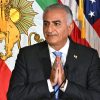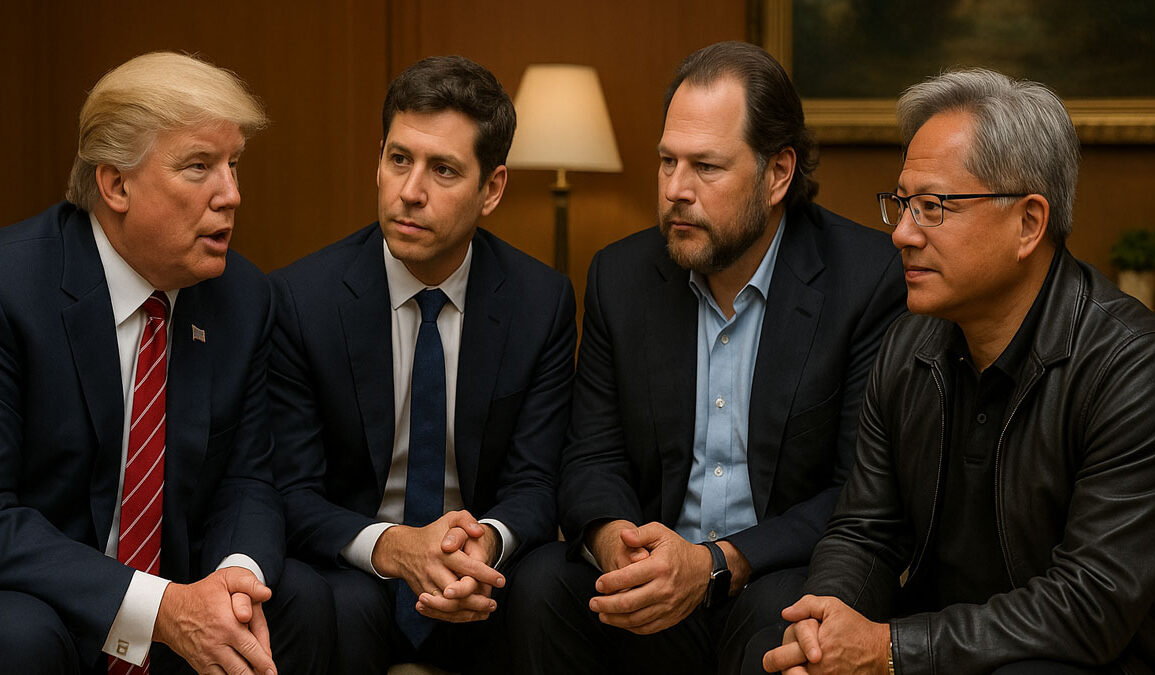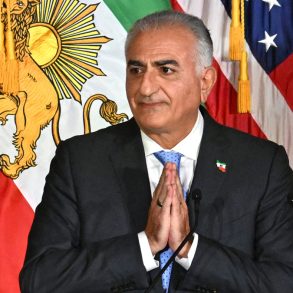A City on the Brink
President Donald Trump had been preparing to send federal troops into San Francisco to deal with what he described as “a city abandoned to crime and ruin under liberal leadership.” But after a series of private phone calls and urgent appeals from Mayor Daniel Lurie and some of the Bay Area’s most influential tech leaders, the president changed course. On Thursday, Trump announced that he would delay the deployment, giving the city’s leadership “a chance” to fix the problem on its own.
The decision came after several tense days of back-and-forth conversations between the White House, San Francisco City Hall, and some of Silicon Valley’s most powerful figures. Nvidia CEO Jensen Huang, Salesforce founder Marc Benioff, and OpenAI chief executive Sam Altman each played a key role in persuading the president that a military-style operation in one of America’s most high-profile cities would do more harm than good.
The Crisis Facing San Francisco
For years, San Francisco has been struggling with crime, open drug use, and homelessness. Entire neighborhoods have been hollowed out by the fentanyl epidemic, and public frustration has been growing over the perception that city government was unable or unwilling to restore order.
Mayor Daniel Lurie, a 48-year-old Democrat and first-time officeholder, has made confronting these issues central to his administration. Backed by his personal fortune as an heir to the Levi Strauss brand, Lurie campaigned on rebuilding the city’s downtown core and reducing crime without political posturing. “San Francisco is on the rise,” he told residents at a Thursday press conference. “Visitors are coming back, buildings are getting leased and purchased, and workers are coming back to the office.”
Lurie said he shared that same message with President Trump during a 25-minute call on Wednesday night, emphasizing that deploying federal troops could derail the fragile recovery already underway. “Having the military and militarized immigration enforcement in our city will hinder our recovery,” he explained. “We are making progress, and I asked him to give us the chance to continue that progress.”
The Tech Industry’s Influence
The campaign to persuade Trump began with a flurry of calls from the city’s business elite. Jensen Huang, the CEO of Nvidia, contacted Trump directly and urged him to speak with Lurie. According to people familiar with the conversation, Huang told the president that the mayor was taking action to improve both safety and the business environment, and that sending in troops could undermine that effort.
Huang also provided Trump with Lurie’s personal phone number, which led to their direct conversation. OpenAI’s Sam Altman, who had served on Lurie’s transition team, reinforced the same point. He argued that the city’s progress was real and that its leaders deserved the opportunity to show results. Altman’s policy chief, Chris Lehane, stayed in close communication with the mayor’s office throughout the crisis, coordinating messages and updates.
Marc Benioff, whose comments earlier in the month had partially sparked the controversy, also played a significant role in defusing it. In an interview with The New York Times on October 10, Benioff had said that he believed the National Guard was needed to help control crime. The remark was widely criticized, and Benioff later apologized, saying he had changed his mind after Salesforce’s Dreamforce conference concluded without incident. “I told the president I was wrong,” Benioff reportedly said on an October 19 call with Trump. “The city handled Dreamforce beautifully. The National Guard isn’t needed here.”
According to White House aides, Benioff’s reversal made a strong impression. Trump has long viewed Benioff as a friend and someone whose opinion carries weight in the business world.
Trump’s Decision and His Reasoning
By midweek, Trump appeared ready to follow through with his plan. Customs and Border Protection agents had already arrived at a Coast Guard base on San Francisco Bay, and additional deployments were expected to follow by Saturday. But that changed after the president received what he described as “four or five calls” from prominent business figures urging restraint.
“I got a great call from some incredible people, some friends of mine, very successful people,” Trump told reporters at the White House. “They told me San Francisco was working hard to reduce crime. So we are holding off that surge, everybody. And we’re going to let them see if they can do it.”
Trump specifically mentioned Jensen Huang and Marc Benioff by name and acknowledged Mayor Lurie’s direct appeal. “I told the mayor, I love what you’re doing, I respect it, and I respect the people that are doing it,” Trump said. “We’re going to give them a chance. But if it doesn’t work out, we’ll do it for them very quickly.”
The president’s tone was a mix of firmness and openness. While he warned that federal forces could still be sent if the situation worsened, he signaled a willingness to give credit where it was due. “They’re the biggest people in the world, a lot of the high tech,” he said of the CEOs who had called him. “They want to do it. And I said, ‘I am so honored to let you do it.’”
Mayor Lurie’s Balanced Approach
Lurie’s handling of the situation reflected a deliberate effort to keep communication open with the White House while avoiding direct confrontation. Unlike California Governor Gavin Newsom, who has repeatedly clashed with Trump, Lurie has maintained a neutral stance, saying he will work with anyone who wants to improve the city.
“I told him the same thing I told our residents,” Lurie said at his press conference. “We are committed to making San Francisco safe and strong again, and we welcome partnership with federal agencies like the DEA to fight drug trafficking. But the presence of troops in our streets would set us back.”
Lurie’s nonpartisan approach earned praise from unexpected quarters. Former House Speaker Nancy Pelosi said on social media that he had shown “exceptional leadership.” Golden State Warriors coach Steve Kerr called the mayor “an absolute superstar” for steering the city toward stability.
Even Governor Newsom’s office commented, saying that Trump had “finally, for once, listened to reason.”
Critics and Caution
Not everyone was convinced the truce would last. Progressive city supervisors Connie Chan and Jackie Fielder both expressed skepticism. Chan warned that “we cannot trust Trump,” while Fielder argued that working closely with federal law enforcement was “a dangerous invitation to a fascist administration.”
Their concerns reflect the deep political divide that continues to define San Francisco’s politics, even as the city tries to recover from years of economic and social decline.
A Pragmatic Pause
For Trump, the decision to stand down showed the side of him that supporters often highlight: a leader willing to be tough but also willing to listen. He made it clear that his patience is not unlimited, but he acknowledged that when a problem appears to be getting solved, he prefers to let local authorities take the lead.
“I think he is making a mistake, because we can do it much faster, and remove the criminals that the law does not permit him to remove,” Trump said about Lurie’s approach. “But he asked me very nicely, and I told him I’d give him a chance.”
For now, the troops will stay on standby, and San Francisco will continue its efforts to restore order without federal intervention. Whether those efforts succeed will determine if the president’s restraint endures—or if his promise to “do it very quickly” comes back into play.
Lurie, for his part, appears undaunted. “We are on the right path,” he told reporters. “Our city is resilient, our people are strong, and I believe San Francisco can show the country that progress is possible when we work together.”








